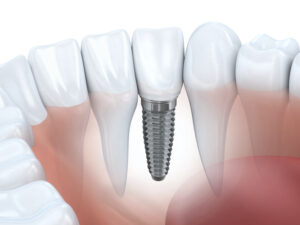
This blog is a guide to the ins and outs of dental implants—and what you personally may stand to gain from them.
…If the title’s caught your attention, we oughta just dive right into it, friend.
So! Read along below for a comprehensive (though by no means overwhelming!) guide to the ins and outs of dental implants—and what you personally may stand to gain from them.
Understanding Dental Implants
Dental implants are, (somewhat) simply put, artificial tooth roots made of biocompatible materials, most commonly titanium, which serve as a permanent “base” for fixed or removable replacement teeth. These implants are surgically placed into the jawbone, where they fuse to create a stable foundation for dental prostheses such as crowns, bridges, or dentures.
Implants are designed to mimic the look, function, and feel of natural teeth. They offer several advantages over traditional tooth replacement options like dentures or bridges, including improved comfort, enhanced chewing ability, and increased self-confidence. With proper care and maintenance, implants can last a lifetime, making them a reliable and long-lasting solution for missing or damaged teeth.
Benefits of Dental Implants Over More Antiquated, “Traditional” Options
Dental implants provide a bevy of benefits that set them apart from traditional tooth replacement options. Foremost among these, you can count on:
- Improved Comfort: implants fuse with the jawbone, creating a stable and secure foundation for replacement teeth. This eliminates discomfort and irritation often associated with removable dentures or bridges.
- Enhanced Chewing Ability: Anchored in the jawbone, implants can withstand the forces of chewing and biting better than removable options. They offer stability and strength, allowing you to enjoy your favorite foods without hesitation.
- Improved Speech: Ill-fitting dentures can slip and move around in the mouth, leading to slurred speech or difficulty speaking. Dental implants provide a secure and stable base for replacement teeth, improving speech and communication.
- Increased Self-Confidence: Implants are designed to look and feel like natural teeth, restoring your smile and boosting your self-confidence. You can speak, laugh, and eat with confidence, knowing that your teeth are secure and beautiful
- Better Oral Health: Dental implants help preserve the jawbone and prevent bone loss, which can occur when teeth are missing. They also don’t require the alteration of adjacent teeth, unlike dental bridges. By promoting good oral health, implants contribute to the overall well-being of your mouth.
Indications and Contraindications of Dental Implants
Dental implants are indeed the perfect option for most individuals—provided they meet certain criteria. The indications for implants include:
- Tooth loss due to decay, injury, or periodontal disease
- A desire for a permanent, natural-looking tooth replacement option
- Adequate bone density and healthy gums to support the implant
- Good overall health and the absence of conditions that may interfere with healing
However, there are some contraindications for implants worth measured consideration, including:
- Insufficient bone density or quantity to support the implant
- Active gum disease or other oral infections
- Certain medical conditions that may affect the healing process
- Chronic use of substances that interfere with healing
- Pregnancy (!), as hormonal changes can affect the healing process
Therefore, it’s of course crucial to consult with a dental professional to determine if implants are suitable for your specific circumstances.
Success Rates and Long-Term Outlook
Dental implants have an extremely high success rate, with over 95% reported success when placed by skilled and experienced implant dentists, according to the American Academy of Implant Dentistry.
However, the long-term outlook of dental implants depends most of all on a few specific key factors:
- Proper Oral Care: Regular brushing, flossing, and dental check-ups are essential to maintain the health and longevity of dental implants. Good oral hygiene habits contribute to the long-term success of implants.
- Overall Health: Underlying medical conditions that affect bone healing may increase the risk of implant failure or complications.
- Various “Lifestyle” Factors: Smoking, excessive alcohol consumption, and poor diet can negatively impact oral health and increase the risk of implant failure.
- Quality of Implant Placement: The skill and experience of the dentist play a crucial role in the long-term success of dental implants. Seek a qualified dentist who uses high-quality materials and up-to-date techniques for optimal outcomes.
Catonsville Dental Care Can Handle All of Your Oral Care Needs
Catonsville Dental Care offers a wide variety of services when it comes to oral health. We have the experience and understanding to diagnose and treat any problem you have as quickly and painlessly as possible. With four dentists available at our office and a commitment to comfort, safety, and relaxation, you can’t find a better provider for your health. We look forward to helping you keep your smile perfect all year long and talking with you about your needs. To schedule an appointment or consultation, visit us online or give us a call at 410-747-1115. For more tips and tricks, follow us on Facebook, Flickr, Twitter, and YouTube.
